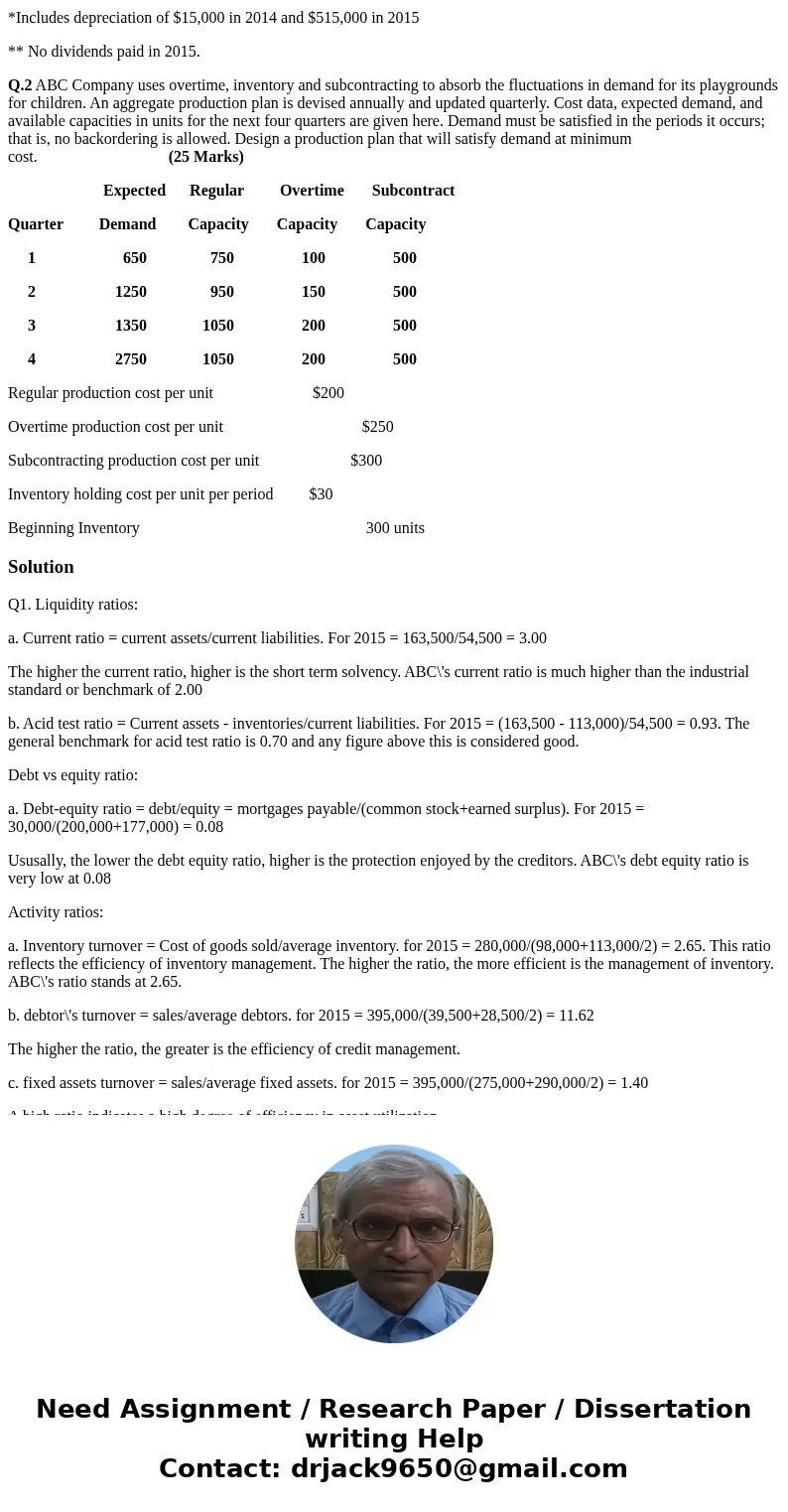Q1 For the years 20141015 the financial statements of ABC Co
Q.1. For the years 2014-1015, the financial statements of ABC Company are given in Table 1 and Table 2. Define the performance ratios (Liquidity, Debt vs Equity, Activity and Profitability) and compare them with industrial standards. (25 Marks)
Table 1. ABC Balance Sheet (1000 of Dollars)
2014 (dollars) 2015 (dollars)
Assets
Cash 18,500 17,000
Marketable securities 0 5,000
Accounts receivable 39,500 28,500
Inventories 98,000 113,000
Total current assets 156,000 163,500
Plant and equipment (net) 275,000 290,000
Other assets 3,000 8,000
Total assets 434,000 461,000
Liabilities
Accounts payable 34,500 18,000
Notes payable 20,000 25,000
Accrued expenses 18,500 11,500
Total current liabilities 73,000 54,500
Mortgage payable 20,000 30,000
Common stock 200,000 200,000
Earned surplus 141,000 177,000
Total liabilities and equities 434,000 461,500
Table 2. ABC Company Income Statement (1000 of Dollars)
2014 (dollars) 2015 (dollars)
Sales 330,000 395,000
Cost of sales* 265,000 280,000
Gross profit 65,000 115,000
Selling and administrative 95,000 88,000
Other expenses 4,000 3,500
Interest 2,000 3,000
Profit before taxes (36,000) 20,500
Income Tax 0 10,000
Net Income (loss)** (36,000) 10,500
*Includes depreciation of $15,000 in 2014 and $515,000 in 2015
** No dividends paid in 2015.
Q.2 ABC Company uses overtime, inventory and subcontracting to absorb the fluctuations in demand for its playgrounds for children. An aggregate production plan is devised annually and updated quarterly. Cost data, expected demand, and available capacities in units for the next four quarters are given here. Demand must be satisfied in the periods it occurs; that is, no backordering is allowed. Design a production plan that will satisfy demand at minimum cost. (25 Marks)
Expected Regular Overtime Subcontract
Quarter Demand Capacity Capacity Capacity
1 650 750 100 500
2 1250 950 150 500
3 1350 1050 200 500
4 2750 1050 200 500
Regular production cost per unit $200
Overtime production cost per unit $250
Subcontracting production cost per unit $300
Inventory holding cost per unit per period $30
Beginning Inventory 300 units
Solution
Q1. Liquidity ratios:
a. Current ratio = current assets/current liabilities. For 2015 = 163,500/54,500 = 3.00
The higher the current ratio, higher is the short term solvency. ABC\'s current ratio is much higher than the industrial standard or benchmark of 2.00
b. Acid test ratio = Current assets - inventories/current liabilities. For 2015 = (163,500 - 113,000)/54,500 = 0.93. The general benchmark for acid test ratio is 0.70 and any figure above this is considered good.
Debt vs equity ratio:
a. Debt-equity ratio = debt/equity = mortgages payable/(common stock+earned surplus). For 2015 = 30,000/(200,000+177,000) = 0.08
Ususally, the lower the debt equity ratio, higher is the protection enjoyed by the creditors. ABC\'s debt equity ratio is very low at 0.08
Activity ratios:
a. Inventory turnover = Cost of goods sold/average inventory. for 2015 = 280,000/(98,000+113,000/2) = 2.65. This ratio reflects the efficiency of inventory management. The higher the ratio, the more efficient is the management of inventory. ABC\'s ratio stands at 2.65.
b. debtor\'s turnover = sales/average debtors. for 2015 = 395,000/(39,500+28,500/2) = 11.62
The higher the ratio, the greater is the efficiency of credit management.
c. fixed assets turnover = sales/average fixed assets. for 2015 = 395,000/(275,000+290,000/2) = 1.40
A high ratio indicates a high degree of efficiency in asset utilization.
Profitability ratios:
a. gross profit margin ratio = gross profit/sales. for 2015 = 115,000/395,000 = 29.11%
b. net profit margin ratio = net profit/sales = 10,500/395,000 = 2.66%
c. ROA = return on assets = net profit/average assets. for 2015 = 10,500/(434,000+461,000/2) = 2.35%
d. ROE = return on equity = net income - dividends/equity = (10,500-0)/(200,000+177,000) = 2.79%



 Homework Sourse
Homework Sourse